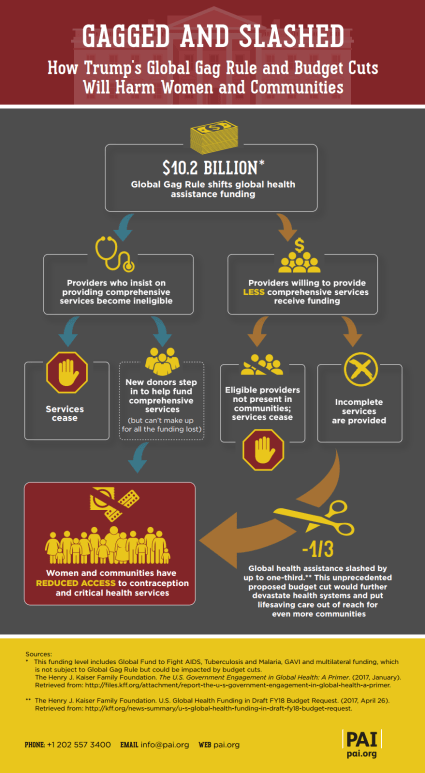President Trump’s Budget Would Cause Millions of Unintended Pregnancies and Abortions around the World

President Trump’s Budget Would Cause Millions of Unintended Pregnancies and Abortions around the World
Elimination of international family planning assistance escalates the Trump administration’s ruthless assault on women and compounds deadly effects of expanded Global Gag Rule.
Today, President Trump unveiled a budget plan for the coming year that would inflict unprecedented and destructive cuts targeted at the poor and most vulnerable, including a complete elimination of international family planning assistance from $607.5 million in FY 2017. Trump’s radical budget threatens women’s access to sexual and reproductive health services that help improve maternal and child health, reduce unintended pregnancies, lower HIV infection rates, and promote women’s rights and empowerment.
Abandoning investments in international family planning would be felt by women and girls who are left without recourse to find alternative means to protect themselves against unplanned pregnancies—many of which will now result in unsafe abortions. Eliminating U.S. assistance for international family planning and reproductive health programs would result in 3.3 million more abortions; 15,000 more maternal deaths, 8 million more unintended pregnancies, and 26 million fewer women and couples receiving services.
The budget follows the Trump administration’s announcement last week of a devastating Global Gag Rule expansion by fifteen orders of magnitude, which would for the first time also impact funding for HIV/AIDS, maternal and child health, malaria, global health security and other global health programs. At the time, officials declared that “the United States remains deeply committed to supporting health programs around the world. This change will have no impact on the total amount of U.S. Government funding for health programs around the world.”
Today’s budget request patently contradicts these assertions. “By zeroing out international family planning, the Trump administration demonstrates its flagrant disregard for human lives,” said Jonathan Rucks, PAI’s director of advocacy. “It wasn’t enough to cut off providers of comprehensive services with Trump’s expanded Global Gag Rule—this budget would ensure that millions more will be left without access to care, imperiling global health systems.”
Investments in sexual and reproductive health programs lead to healthier communities and greater economic potential and security abroad. U.S. investments in family planning and reproductive health programs are cost-effective and save lives. Every $1 invested in contraception saves $1.47 in pregnancy-related care and up to $150 for every dollar invested in other development areas.
Learn more about how Trump’s Global Gag Rule and budget cuts will harm women and communities.
###
PAI champions policies that put women in charge of their reproductive health. We work with policymakers in Washington and our network of partners in developing countries to remove roadblocks between women and the services and supplies they need. For over 50 years, we’ve helped women succeed by upholding their basic rights. To learn more, visit pai.org.
Trump Administration Makes Expanded Global Gag Rule Even More Deadly, Renames it “Protecting Life in Global Health Assistance”
Today, the U.S. State Department announced plans for implementing President Trump’s vastly expanded Global Gag Rule. All foreign NGOs receiving any U.S. global health assistance will now be forced to choose between receiving U.S. funding and providing comprehensive sexual and reproductive health care.
In addition to burdening organizations receiving family planning and reproductive health assistance, for the first time, providers implementing programs for maternal and child health, nutrition, HIV/AIDS (including PEPFAR), malaria, tuberculosis, infectious diseases, neglected tropical diseases, and water sanitation and hygiene will now be subject to oppressive Global Gag Rule restrictions. This impacts nearly $9 billion in global health assistance for programs at USAID, the Department of State and the Department of Defense.
Trump’s Global Gag Rule impacts about 15 times more U.S. funding and also extends the reach of restrictions beyond NGO grants and cooperative agreements to contracts. This will also broaden the reach of the policy’s already deadly effects, including increasing unintended pregnancies, unsafe abortions, and maternal and child mortality. Previously known within the U.S. government as the Mexico City Policy, Trump’s expanded Global Gag Rule has been deceptively re-branded “Protecting Life in Global Health Assistance.”
“In his campaign to stifle women’s autonomy, Trump’s expanded Global Gag Rule will cause unspeakable damage to integrated care efforts across all health sectors. It will cost many around the world their lives—especially women,” said Suzanne Ehlers, President and CEO of PAI. “Despite the Trump administration’s ludicrous rebranding of the policy, the Global Gag Rule is unmistakably deadlier than ever.”
The expansion of the Global Gag Rule by President Trump threatens to exclude some of the most effective—and in some cases, only—local health providers in 60 low- and middle-income countries. Without funding, these organizations will be unable to provide integrated maternal health care with contraceptive services, HIV prevention, care and treatment services, or counsel women on their potential risks of Zika infection, among many other services, leaving communities and entire health systems devastated.
###
PAI champions policies that put women in charge of their reproductive health. We work with policymakers in Washington and our network of partners in developing countries to remove roadblocks between women and the services and supplies they need. For over 50 years, we’ve helped women succeed by upholding their basic rights. To learn more, visit pai.org.

